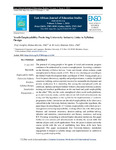| dc.description.abstract | The potential of young people to be agents of social and economic progress continues to be undermined by massive unemployment. According to statistics on the Ministry of Public Service, Youth and Gender affairs website, youth unemployment in Kenya stands at 61%. This is very alarming yet according to the Global Youth Development Index and Report of 2016. Young peopleare a force for peace, democracy, equality and good governance, a catalyst for global consensus-building, and an essential resource for sustainable development and poverty eradication. It is interesting that among the unemployed youth are certificate, diploma and degree holders! Is there a disconnect between academic training and resultant qualifications on the one hand and youth employability on the other? Why are the youth unemployed when social media platforms, print and electronic media, and the internet are full of job advertisements day in day out? My hypothesis is that syllabi for the implementation of academic programmes in the Universities are devoid of employability skills which are a critical link in the University-Industry interface. To explore the hypothesis, this paper began by describing the 21stCentury employability skills which are self-management and taking responsibility, working effectively with other people, business and customer awareness, decision-making and problem-solving, initiative and enterprise, communication and literacy, numeracy,and using ICT. Focusing on teaching in selected higher education institutions, this paper further reviews selected job advertisements to identify the salient skills that industry players seek in jobapplications. Next, the paper evaluates university course syllabi with the aim of establishing how these skills have been integrated. The paper recommends that University-Industry stakeholder engagement is integral to syllabus design and implementation inaddition to fostering youth employability. | en_US |

